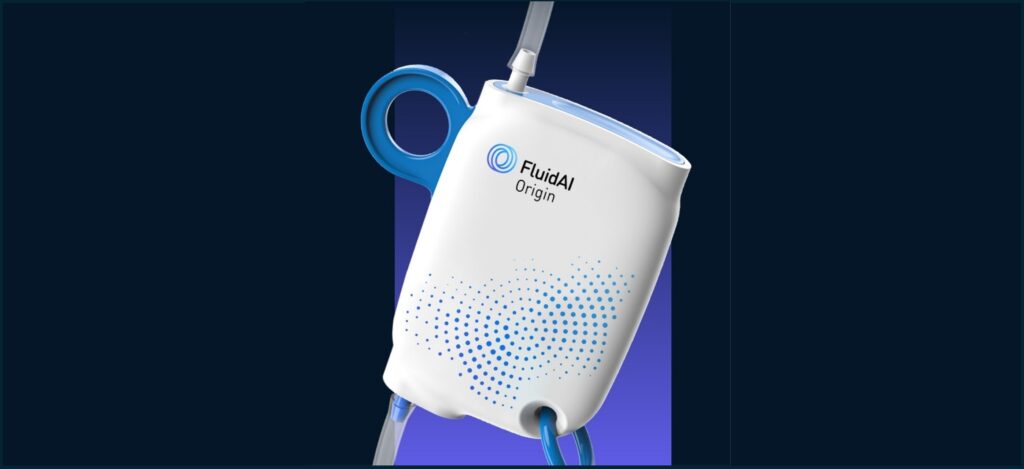Canadian medtech company FluidAI Medical has received FDA 510(k) clearance for its Origin device for post-operative monitoring.
The Origin is designed to continuously analyze surgical effluent, the fluid draining from a surgical site, following surgery.
Fluid AI Medical says the FDA’s clearance of FluidAI Medical’s Origin device is a pivotal moment in the reimagining of post-operative care.
By combining nanosensor technology that measures pH and electrical conductivity with proprietary machine learning algorithms, Origin aims to detect early warning signs of post-surgical complications such as anastomotic leaks before they manifest clinically.
Anastomotic leaks, which occur when there is a breakdown at the surgical reconnection of intestinal or other luminal tissues, are among the most serious complications following gastrointestinal surgeries. They often present subtly and late, and once symptoms appear, they can rapidly escalate into sepsis, prolonged hospitalization, additional surgeries or even death.
FluidAI’s technology seeks to detect these complications within 48 hours post-surgery, earlier than conventional diagnostics and clinical indicators typically allow.
XTALKS WEBINAR: IVD Study Steps for Success: Safety and Quality of Global IVD Clinical Performance Studies
Live and On-Demand: Thursday, November 13, 2025, at 11am EST (5pm CET/EU-Central)
Register for this free webinar to learn how global in vitro diagnostic device (IVD) studies can meet regulatory expectations while maintaining safety and data integrity.
FluidAI’s CEO, Youssef Helwa, said in the company’s press release that the FDA clearance is a pivotal first step in advancing the company’s mission and expanding access to new markets: “This is a foundational step toward a future of data-driven, post-operative recovery. Origin will enable clinicians to observe subtle biochemical shifts that may herald optimal recovery or foreshadow complications in the near future. Its continuous sensing unlocks a new data layer, one that will enable our predictive models, and will pave the way for a new era of intelligent recovery, where patient care becomes proactive rather than reactive.”
In clinical practice, continuous effluent monitoring has the potential to change the delivery of post-operative care.
By providing early predictive signals, the Origin device enables care teams to intervene proactively rather than reactively. This could translate into earlier imaging, targeted antibiotic use or timely surgical revisions, all of which may reduce the severity of complications, shorten hospital stays and improve patient outcomes.
For patients who do not display warning signals, the technology may support earlier and more confident discharge decisions, helping hospitals optimize resources and bed utilization. Over time, the data generated by Origin could also inform evidence-based protocols, risk models and personalized recovery pathways.
This development reflects a broader shift in healthcare from intermittent, manual monitoring toward continuous, sensor-driven oversight.
Traditional post-operative care relies heavily on periodic vital sign checks, laboratory tests and clinical observation. In contrast, Origin offers real-time, continuous analysis of data streams to support clinical decision-making.
By enabling earlier detection of complications and providing actionable insights through continuous monitoring, the technology has the potential to improve surgical outcomes, enhance hospital efficiency and redefine standards of care.
Related: FDA Approves Zusduri as First Non-Surgical, Chemoablative Option for Recurrent Bladder Cancer Subset
The global patient monitoring devices market, valued at over $50 billion in 2024, is projected to surpass $118 billion by 2033, driven by rising surgical volumes, value-based care models and advances in sensor and AI technologies.
Major players like GE HealthCare, Philips, Medtronic and Masimo dominate the broader monitoring landscape, while specialized companies such as Senzime, Caretaker Medical and Deltex are carving out niches in perioperative and post-operative analytics.
In July, FluidAI received $2 million in funding from the Government of Canada through the Federal Economic Development Agency for Southern Ontario (FedDev Ontario) to assist in the company’s manufacturing processes and fast-track the commercialization of its postoperative care technologies for global markets.












Join or login to leave a comment
JOIN LOGIN